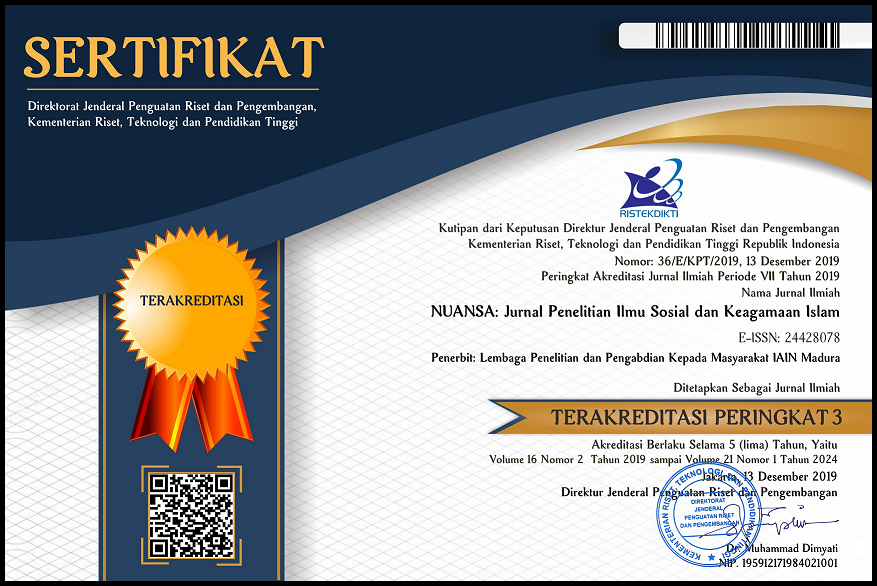Zuhud Vis A Vis Modernity: The Resistance of Rural Community to Modernity
 Abstract views: 333
,
Abstract views: 333
,
 pdf downloads: 267
pdf downloads: 267
Abstract
This research aims to reveal the opposition of a rural community at Kedungbanteng, Paguyangan, Brebes in responding to the pace of modernity, which tends to degrade human morality as its main actor. This study used a qualitative method with a phenomenological approach. This study uses the interview method with structured interview guidance and participatory observation. A combination of several existing techniques carried out the data collection. Those techniques were observation, interviews, and documentation. Meanwhile, to test the validity of the data, three methods were used: source triangulation, technical triangulation, and time triangulation. It was found that the opposition applied by society in responding to the fundamental changes due to modernization was using zuhud behaviour. Specifically, these oppositions were manifested by eliminating materialism, increasing the caution of seeking sustenance (wirai), and firmly rejecting the formalist tradition diversity (fikih oriented). The zuhud movement can be carried out because a charismatic figure initiated it. In addition, what is quite prominent is the tomb pilgrimage to certain tombs believed to be the tombs of local ancestors and kyai. Pilgrimage can increase awareness that life exists in the world and in the grave; there is also life in the afterlife. So that someone will be careful and prepare provisions for the next life. The emphasis is on the spiritual practice of religious teachings rather than studying texts. So rarely try to find arguments as the basis of certain practices.
(Penelitian ini bertujuan untuk mengungkap resistensi kelompok masyarakat di Dusun Kedungbanteng, Desa Paguyangan, Kab. Brebes dalam menanggapi laju modernisasi yang dewasa ini cenderung menurunkan moralitas manusia sebagai aktor utamanya. Jenis penelitian ini adalah penelitian kualitatif dan menggunakan pendekatan fenomenologi transendental. Penelitian ini juga dilengkapi dengan metode wawancara serta pedoman wawancara terstruktur, serta observasi partisipatif. Pengumpulan data dilakukan dengan menggabungkan beberapa teknik yang ada. Teknik-teknik tersebut adalah observasi, wawancara, dan dokumentasi. Sedangkan untuk menguji keabsahan data digunakan tiga metode yaitu triangulasi sumber, triangulasi teknis, dan triangulasi waktu. Dalam penelitian ini ditemukan bahwa resistensi yang dilakukan masyarakat dalam menyikapi perubahan mendasar akibat modernisasi adalah praktik zuhud. Lebih khusus lagi, secara praktis resistensi ini dimanifestasikan oleh; menghilangkan paham materialis, meningkatkan kehati-hatian dalam mencari rezeki (wirai) dan sangat menentang tradisi agama formalis (berorientasi fikih). Gerakan zuhud tersebut dapat terlaksana karena diprakarsai oleh sosok yang kharismatik. Selain itu, yang cukup menonjol adalah ziarah makam ke makam-makam tertentu yang diyakini sebagai makam para leluhur dan kyai setempat. Ziarah dapat meningkatkan kesadaran bahwa hidup ada di dunia dan di alam kubur; ada juga kehidupan di akhirat. Sehingga seseorang akan berhati-hati dan mempersiapkan bekal untuk kehidupan selanjutnya. Penekanan terdapat pada pengamalan spiritual ajaran agama daripada mempelajari teks. Sehingga jarang mencoba mencari argumentasi sebagai dasar dari praktek-praktek tertentu.)
Downloads
References
Akhiyat. “Tasawuf Dan Akulturasi Budaya: Telaah Tasawuf Dalam Perspektif Culture and Education.” Jurnal As-Salam 1, no. 1 (2016): 1–17. http://jurnal-assalam.org/index.php/JAS/article/view/40.
Bahri, Nur Alim, and Iwan Triyuwono. “Asset’s Concept Based on Zuhud : Reflection Value of Simplicity in Islam.” JURNAL Riset Akuntansi Dan Keuangan Indonesia 6, no. 2 (2021): 215–28.
Djaelani, Abdul Qadir. Koreksi Terhadap Ajaran Tasawuf. Jakarta: Gema Insani Press, 1996.
Effendy, Mochtar. Ensiklopedi Agama Dan Filsafat. Palembang: Universitas Sriwijaya, 2000.
Elizabeth, Misbah Zulfa. “Perlawanan Visual Perempuan Dalam Poster.” JSW: Jurnal Sosiologi Walisongo 1, no. 2 (2017).
Fudholi, Moh. “Konsep Zuhud Al-Qushayrî Dalam Risâlah Al-Qushayrîyah.” Teosofi: Jurnal Tasawuf Dan Pemikiran Islam 1, no. 1 (2011).
Güner, Osman. “Poverty in Traditional Islamic Thought : Is It Virtue or Captivity ?” Studies in Islam and the Middle East [SIME] 2, no. 1 (2005): 1–12.
Hamka. Tasawuf Modern: Bahagia Itu Dekat Dengan Kita, Ada Dalam Diri Kita. Jakarta: Republika, 2015.
Hidayati, Tri Wahyu. “Perwujudan Sikap Zuhud Dalam Kehidupan.” Milllati, Journal of Islamic Studies Dan Humanities 1, no. 2 (2016): 243–58. https://doi.org/10.18326/millati.v1i1.243-258.
Jamil, Muhammad Mukhsin. “Kidung Wahyu Kalaseba: Javanese Spiritualism and Psycho-Cultural Resilience.” Walisongo: Jurnal Penelitian Sosial Keagamaan 29, no. 1 (2021): 1–26. https://doi.org/10.21580/ws.29.1.7976.
Junaedi, Mahfud, and Mirza Mahbub Wijaya. Pengembangan Paradigma Keilmuan Perspektif Epistemologi Islam: Dari Perenialisme Hingga Islamisasi, Integrasi-Interkoneksi Dan Unity of Science. Jakarta: Prenadamedia Group, 2019.
M. Amin Syukur. Zuhud Di Abad Modern. Yogyakarta: Pustaka pelajar, 1997.
M. Amin Syukur, and Masyharuddin. Intelektualisme Tasawuf: Studi Intelektualisme Tasawuf Al-Ghazali. Yogyakarta: Pustaka Pelajar, 2002.
Maring, Prudensius. “Strategi Perlawanan Berkedok Kolaborasi; Sebuah Tinjauan Antropologi Kasus Penguasaan Hutan.” Partner 17, no. 1 (2010).
Meier, Fritz. Sufisme: Merambah Ke Dunia Mistik Islam. Yogyakarta: Pustaka Pelajar, 2004.
Munawir, Ahmad Warson. Al-Munawwir: Kamus Arab-Indonesia Terlengkap. Edited by KH. Ali Ma’shum and KH. Zainal Abidin Munawwir. Surabaya: Pustaka Progressif, 1997.
Pätzold, Uwe U. “5 Self-Defense and Music in Muslim Contexts in West Java.” In Divine Inspirations. Oxford University Press, 2011. https://doi.org/10.1093/acprof:oso/9780195385410.003.0006.
Rosana, Ellya. “Modernisasi Dan Perubahan Sosial.” TAPIs 7, no. 12 (2011): 1–30.
Rubaidi. “Kontekstualisasi Sufisme Bagi Masyarakat Urban.” Jurnal THEOLOGIA 30, no. 1 (2019): 127–52. https://doi.org/10.21580/teo.2019.30.1.3145.
———. “The New Pseudo-Sufi Order of the Majelis Shalawat Among Urban Muslims in East Java.” Journal of Indonesian Islam 14, no. 2 (2020): 431–56. https://doi.org/10.15642/JIIS.2020.14.2.431-456.
Safuwan. “Gaya Hidup, Konsumerisme Dan Modernitas.” Jurnal SUWA 5, no. 1 (2007).
Salamah-Qudsi, Arin. “The Economics of Female Piety in Early Sufism.” Religions, 2021. https://doi.org/10.3390/rel12090760.
Schimmel, Annemarie. “Sufism.” Encyclopedia Britannica, n.d. https://www.britannica.com/topic/Sufism.
Scott, James C. Weapon of The Weak: Everyday Forms of Peasant Resistance. London: Yale University Press, 1985.
Supyandi, Dika, Eliana Wulandari, and Iwan Setiawan. “Reviews on Theories and Practices of Modernization: Rural Experience in Indonesia.” In Advances in Social Science, Education and Humanities Rese, 129:129–32. Atantis Press, 2018. https://doi.org/10.2991/icsps-17.2018.27.
Syukur, M. Amin. “Aplikasi Zuhud Dalam Sorotan Al-Qur’an.” UIN Sunan Kalijaga, 1996. http://digilib.uin-suka.ac.id/14488/.
———. Menggugat Tasawuf. Yogyakarta: Pustaka Pelajar, 1999.
Thohir, Umar Faruq. “Tasawuf Sebagai Solusi Bagi Problematika Kemodernan: Studi Pemikiran Tasawuf M. Amin Syukur.” Jurnal THEOLOGIA 24, no. 2 (2013): 43–68. https://doi.org/10.21580/teo.2013.24.2.327.
Thohir, Umar Faruq, and Irma Rumtianing Uswatul Hasanah. “A Divine Love of Annemarie Schimmel; A Sufism Study of an Orientalist.” Dialogia 19, no. 1 (2021): 10–27.
Ubaedillah, Achmad. “Sufi Islam and the Nation State: Darul Arkam Movement in the Post Suharto Era of Indonesia.” Indonesian Journal of Islam and Muslim Societies 5, no. 1 (2015): 79–110. https://doi.org/10.18326/ijims.v5i1.79-110.
Ulfa, Novi Maria, and Dwi Istiyani. “Etika Dalam Kehidupan Modern: Studi Pemikiran Sufistik Hamka.” Esoterik: Jurnal Akhlak Dan Tasawuf 2, no. 1 (2016).
Wulandari, Devita, Okta Hadi Nurcahyono, and Abdul Rahman. “Revisiting Tradition-Religion Relationship in Javanese Tayub Dance : How Local Community Deals with Dilemmas.” Walisongo: Jurnal Penelitian Sosial Keagamaan 29, no. 1 (2021): 121–40. https://doi.org/10.21580/ws.29.1.8578.
Wyrostkiewics, Michal. “Corruption As An Anthropological Problem. Reflections Based On The Papal Document on Transparency, Control And Competition In Public Life.” Journal for the Study of Religions and Ideologies 19, no. 57 (2020): 91–103.
Zubaedi, Zulkarnain S, Mus Mulyadi, Alfauzan Amin, Zulkarnain Dali, Asiyah Asiyah, Abdul Aziz Bin Mustamin, and Badawi Badawi. “Internalization of Character Values Through Sufistic Approach.” Pysichology and Education 58, no. 2 (2021): 2680–91. https://www.archives.palarch.nl/index.php/jae/article/view/6699.
The journal operates an Open Access policy under a Creative Commons Attribution-NonCommercial 4.0 International License (CC-BY-NC) 
Authors who publish with this journal agree to the following terms:
- Authors retain copyright and grant the journal right of first publication with the work simultaneously licensed under a Creative Commons Attribution License that allows others to share the work with an acknowledgement of the work's authorship and initial publication in this journal.
- Authors are able to enter into separate, additional contractual arrangements for the non-exclusive distribution of the journal's published version of the work (e.g., post it to an institutional repository or publish it in a book), with an acknowledgement of its initial publication in this journal.
- Authors are permitted and encouraged to post their work online (e.g., in institutional repositories or on their website) prior to and during the submission process, as it can lead to productive exchanges, as well as earlier and greater citation of published work.





















